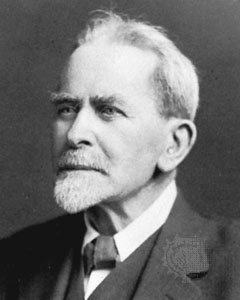James Frazer
Aspeto
| James Frazer | |
|---|---|
| Nascimento | James George Frazer 1 de janeiro de 1854 Glasgow |
| Morte | 7 de maio de 1941 (87 anos) Cambridge |
| Cidadania | Reino Unido |
| Ocupação | antropólogo, escritor, historiador, mitógrafo, erudito clássico, teólogo, folclorista, etnologista, etnógrafo |
James Frazer (1 de janeiro de 1854 - 7 de maio de 1941) foi um influente antropólogo escocês nos primeiros estágios dos estudos modernos de mitologia e religião comparada.
Verificadas
[editar]O Ramo de Ouro
[editar]- Se analisarmos os princípios de pensamento nos quais a magia se baseia, provavelmente descobriremos que eles se dividem em dois: primeiro, que semelhante produz semelhante, ou que um efeito se assemelha à sua causa; e, segundo, que as coisas que uma vez estiveram em contato umas com as outras continuam a agir umas sobre as outras à distância após o contato físico ter sido interrompido. O primeiro princípio pode ser chamado de Lei da Semelhança, o último de Lei do Contato ou Contágio. Do primeiro destes princípios, nomeadamente a Lei da Semelhança, o mágico infere que ele pode produzir qualquer efeito que desejar simplesmente imitando-o: do segundo ele infere que tudo o que ele fizer a um objeto material afetará igualmente a pessoa com quem o objeto esteve em contato uma vez, quer fizesse parte de seu corpo ou não.
- -If we analyze the principles of thought on which magic is based, they will probably be found to resolve themselves into two: first, that like produces like, or that an effect resembles its cause; and, second, that things which have once been in contact with each other continue to act on each other at a distance after the physical contact has been severed. The former principle may be called the Law of Similarity, the latter the Law of Contact or Contagion. From the first of these principles, namely the Law of Similarity, the magician infers that he can produce any effect he desires merely by imitating it: from the second he infers that whatever he does to a material object will affect equally the person with whom the object was once in contact, whether it formed part of his body or not.
- -Capítulo 3, Magia por Simpatia
- Há fortes bases para pensar que, na evolução do pensamento, a magia precedeu a religião.
- -There are strong grounds for thinking that, in the evolution of thought, magic has preceded religion.
- -Capítulo 3, Magia por Simpatia
- Desde os tempos mais remotos, o homem tem estado empenhado na busca de regras gerais pelas quais possa transformar a ordem dos fenômenos naturais em seu próprio benefício, e na longa busca ele reuniu um grande tesouro de tais máximas, algumas delas de ouro e outras delas mera escória. As regras verdadeiras ou de ouro constituem o corpo da ciência aplicada que chamamos de artes; as falsas são a magia.
- -From the earliest times man has been engaged in a search for general rules whereby to turn the order of natural phenomena to his own advantage, and in the long search he has scraped together a great hoard of such maxims, some of them golden and some of them mere dross. The true or golden rules constitute the body of applied science which we call the arts; the false are magic.
- -Capítulo 4, Magia e Religião.
- Se a humanidade sempre tivesse sido lógica e sábia, a história não seria uma longa crônica de tolice e crime.
- -If mankind had always been logical and wise, history would not be a long chronicle of folly and crime.
- -Capítulo 29, O Mito de Adônis
- O mundo não pode viver no nível dos seus grandes homens.
- -The world cannot live at the level of its great men.
- -Capítulo 37, Religiões Orientais no Ocidente.
- A abundância, a solidez e o esplendor dos resultados já alcançados pela ciência são adequados para nos inspirar uma alegre confiança na solidez do seu método. Aqui, finalmente, depois de tatear no escuro por incontáveis eras, o homem encontrou uma pista para o labirinto, uma chave de ouro que abre muitas fechaduras no tesouro da natureza. Provavelmente não será exagero dizer que a esperança de progresso - moral e intelectual, bem como material - no futuro está ligada ao destino da ciência, e que cada obstáculo colocado no caminho da descoberta científica é um mal para a humanidade.
- -The abundance, the solidity, and the splendour of the results already achieved by science are well fitted to inspire us with a cheerful confidence in the soundness of its method. Here at last, after groping about in the dark for countless ages, man has hit upon a clue to the labyrinth, a golden key that opens many locks in the treasury of nature. It is probably not too much to say that the hope of progress--moral and intellectual as well as material--in the future is bound up with the fortunes of science, and that every obstacle placed in the way of scientific discovery is a wrong to humanity.
- -Capítulo 69, Adeus a Nemi

